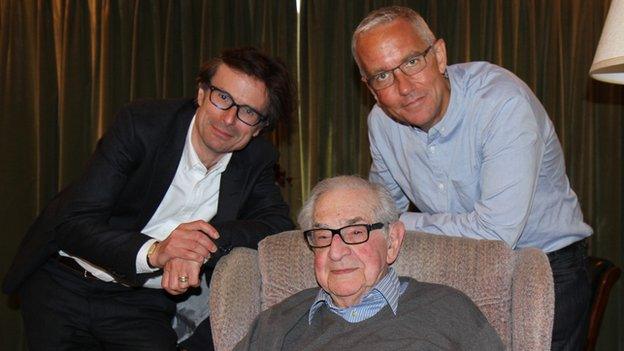Queen visits Germany's Bergen-Belsen concentration camp site
- Published
The Queen visited Belsen concentration camp on the last day of her state visit
The Queen has made her first visit to a World War Two concentration camp, Bergen-Belsen, in northern Germany.
The camp, where teenage diarist Anne Frank was among thousands to die, was liberated by British soldiers in 1945.
The UK monarch, accompanied by the Duke of Edinburgh, laid a wreath at a memorial there on the final day of her four-day state visit to Germany.
She met British veterans who liberated the camp, and heard stories of the "horrific" scenes that greeted them.
More than 50,000 prisoners from all over Europe were killed at Bergen-Belsen or died later as a result of their treatment in the camp.

At the scene
By Peter Hunt, BBC royal correspondent
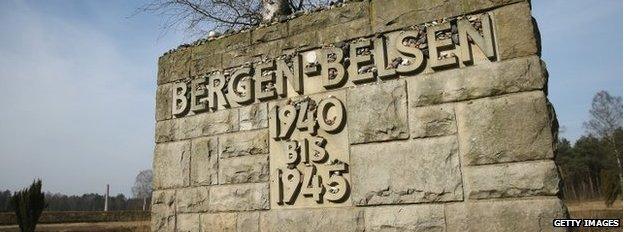
This was a Queen who lived through World War Two as a teenager, coming to learn first-hand about some of the very worst excesses of a former enemy.
With Prince Philip she passed the mounds that mark where the mass graves are. There are 13 mounds. They contain the remains of more than 20,000 people.
There was no pomp or ceremony; just a couple from the wartime generation taking their time to reflect and to pay their respects.
The 89-year-old Queen and her husband, who's 94, walked quite a distance through what remains of the camp, and met a few of those who lived and three of the British soldiers who set them free. The survivors and the liberators told them about their shared experience of horror.
At the end the Queen said to one person: "It's difficult to imagine isn't it?"

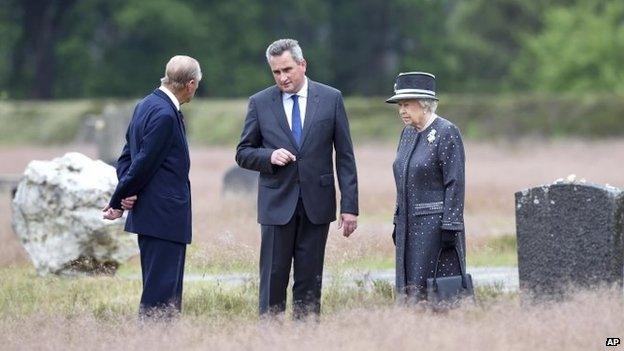
The Queen and Prince Philip were given a tour of the memorial by director Jens-Christian Wagner
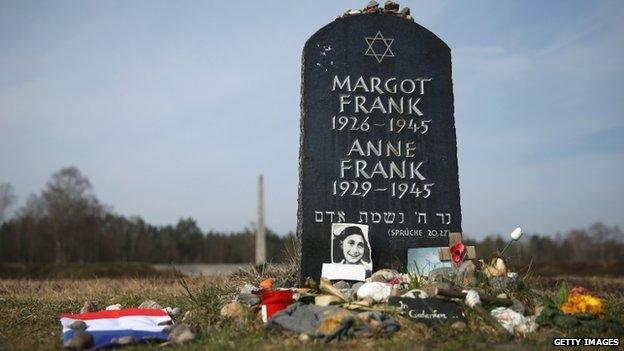
A symbolic tombstone commemorates Anne Frank and her sister Margot

Read more

The Queen, who is patron of the Holocaust Memorial Day Trust, had not visited a concentration camp before and it is believed she requested the trip.
She was taken on a tour of the site - which was razed to the ground and is now a museum and memorial to those who died - with the minimum of protocol.
She met with representatives of Jewish and Christian communities, as well as a small group of survivors and liberators.
Among them was veteran pilot Captain Eric "Winkle" Brown, 96. The Queen asked him what sort of scene greeted the British troops when he first arrived.
"I told her this was just a field of corpses," he said.
He said the Queen replied: "It must have been horrific really."
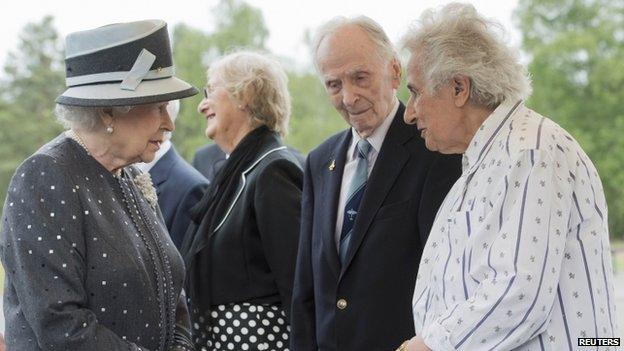
The Queen met with survivors and liberators of Bergen-Belsen, including former pilot Eric "Winkle" Brown (centre)
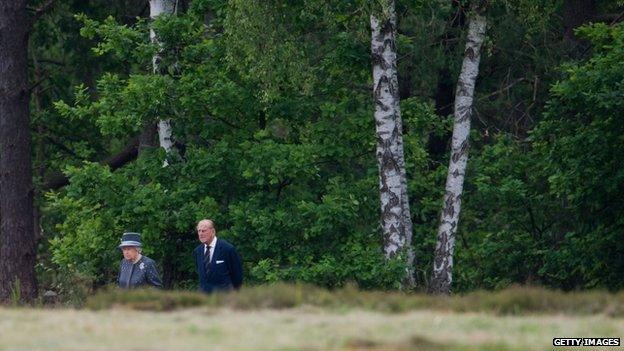
Dressed in a sombre grey, and with minimum protocol, the Queen and Prince Philip toured the site
"She was listening very carefully. I would say she was quite affected by the atmosphere here. You can't avoid it, can you?" he added.
The Queen also visited a memorial to Anne Frank and her sister Margot.
Millions of copies of Anne Frank's Diary, written during the two years the teenager and her family hid from the Nazis in occupied Amsterdam, have been sold across the world.
Dr Jens-Christian Wagner, head of the Bergen-Belsen Memorial who gave the royal couple a guided tour, said the experience of visiting the site had been an emotional one for the Queen.
British troops found 60,000 prisoners when they entered the gates in April 1945, suffering from malnutrition, disease and the brutal treatment they had endured.
Lasting horror
Thousands of corpses also lay unburied on the camp grounds.
Another of the first British soldiers to arrive after liberation described the scene to BBC Radio 5live.
Corporal Bernard Levy, who was 19 at the time, said: "It was so horrendous that nobody could take it in.
"For 68 years I'd shut the whole subject out of my mind.
"But we've got to make sure that this particular horror stays in people's minds."
The Queen was greeted by cheering crowds in Berlin, as Jenny Hill reports
The visit to the former concentration camp was the Queen's final engagement before returning to the UK.
During her official visit, she also met German Chancellor Angela Merkel and visited Berlin and Frankfurt.
- Published25 June 2015
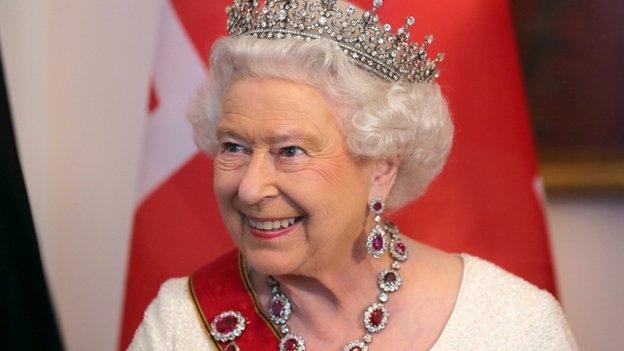
- Published25 June 2015
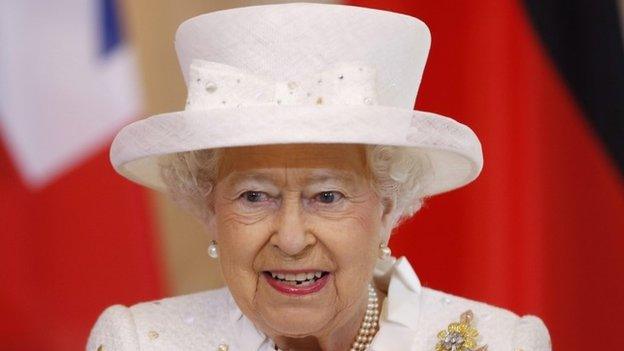
- Published24 June 2015
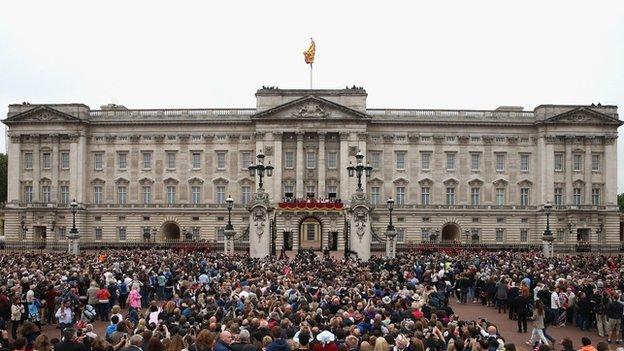
- Published23 June 2015
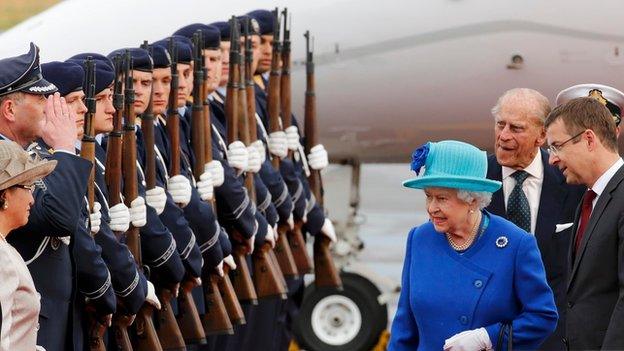
- Published23 June 2015
